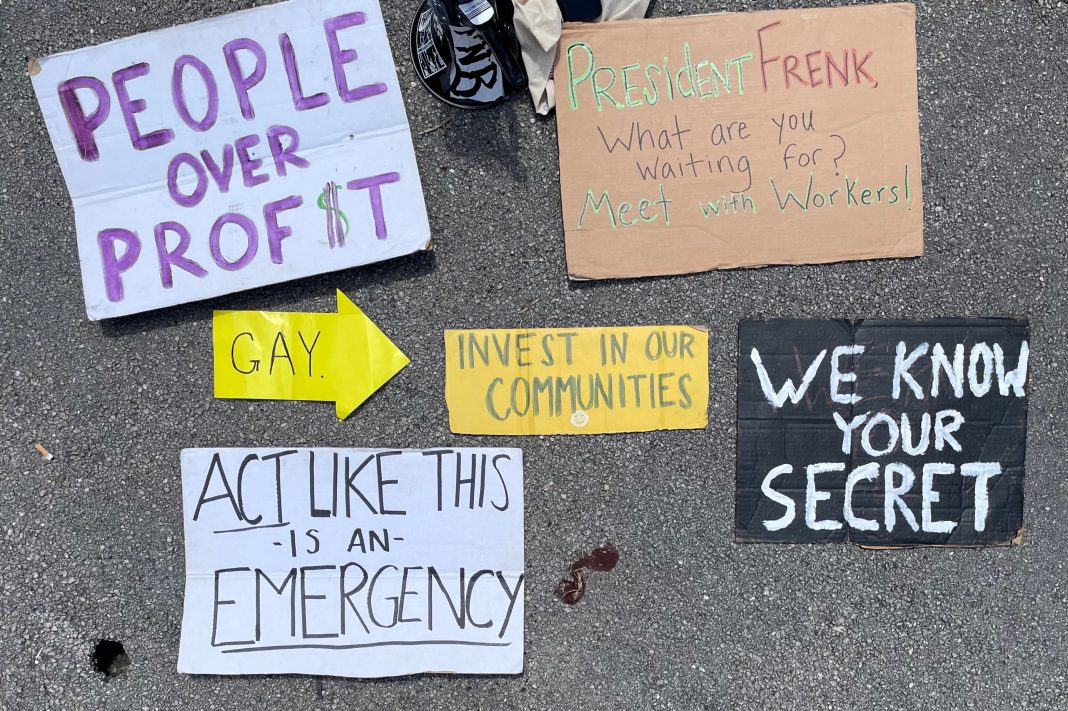
A newly-formed group of University of Miami community members gathered in protest against House Bill 999 across the street from UM on Friday, April 21.
The group, dubbed “Student-led coalition” at the moment, is a collection of students, faculty and staff, primarily from UM. Birthed in response to Florida legislation, it also stands against other injustices and marginalizations throughout the past 20 years.
Alongside its Friday protest, the group released a demand letter, introducing itself and enumerating its demands.
“We are establishing a space where, no matter our gender, class, race, or any other classifications used to separate us, we can together solve the problems facing all of us,” the beginning of the letter reads. “By disrupting business as usual, we can help change the world.”
The coalition used the demonstration to protest the UM’s administration’s sparse statements against Florida legislation in addition to HB 999. The proposed law aims to ban funding of Diversity, Equity and Inclusion (DEI) initiatives at Florida public universities.
While the law clearly threatens DEI workshops, it also prohibits classes and majors supporting “critical race theory, gender studies, radical feminist theory and queer theory” and further regulates educational content at public universities.
“I can’t imagine having that taken away because that is such an integral part of my activism,” said Maha Hejazi, a sophomore studying sociology and global health studies.
While these policies would not directly affect UM, many students fear the implications of future legislation. Others believe the current legislation is dangerous, even for those at private universities.
“The scary part is the ‘now,” said Morgan Gianola, a postdoctoral researcher at UM in psychology and cardiovascular behavioral medicine.
Both he and Hejazi referenced last year’s “Don’t Say Gay” bill which was recently expanded to restrict LGBT-related education up to the 12th grade in Florida public schools.
“I don’t think that [the state] banning drag shows or preventing LGBTQ people from having a space on campus is the biggest problem in Florida right now,” Hejazi said in reference to Florida’s recent prohibitions. “We can talk about the rise in rent. We can talk about our housing crisis.”
Via the protest and other actions, the coalition aims to garner attention from the student body and support for the cause. At UM, this includes signing a demand letter shared throughout campus and showing up, if able, to demonstrations.
The demand letter calls on the University to “Publicly condemn the actions of the Florida government and [stand] in solidarity with the minority students being targeted.”
“They all need to recognize the help is not going to come from the top,” Gianola said.
At the time of writing, UM Communications had not yet responded to a request from The Miami Hurricane to comment on HB 999 and concerns from the coalition that the University was not making enough public statements.
The demand letter goes on to address other ways the University could specifically combat HB 999, including helping fund access to banned books in Florida public schools and improving UM DEI training to include accessibility training.
The letter also touches on broader issues, including funding affordable housing at UM and overhauling UM’s demonstration policy to not require registration of a demonstration with the Dean of Students.
Across Ponce de Leon, the group met outside of UM’s property, which allowed them to gather spontaneously, a previous sticking point for the group.
The protest joins growing momentum at UM and throughout Florida to denounce the bill. Just the day before, students demonstrated in the center of campus on Lakeside Patio against HB 999. Through recent weeks, a letter has also circulated UM students, staff and faculty, protesting the restrictions on education.
The letter features nearly 1,000 signatures as a Miami Herald article reports. Among the signatures are some names listed as a part of Student Affairs, a branch of UM administration.
“Florida House Bill 999 violates the principles and practices of shared governance in Florida public universities by eliminating the need for faculty consultation in the appointment of new faculty and by allowing for post-tenure faculty reviews by boards of trustees and presidents at any time for such reasons as “insubordination,” which will have a chilling effect on faculty,” the letter states.
“We stand in solidarity with our colleagues and students in the State University System of Florida in opposing this unprecedented attempt to exert political control over free thought and professional expertise in higher education,” the final line reads.





